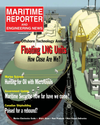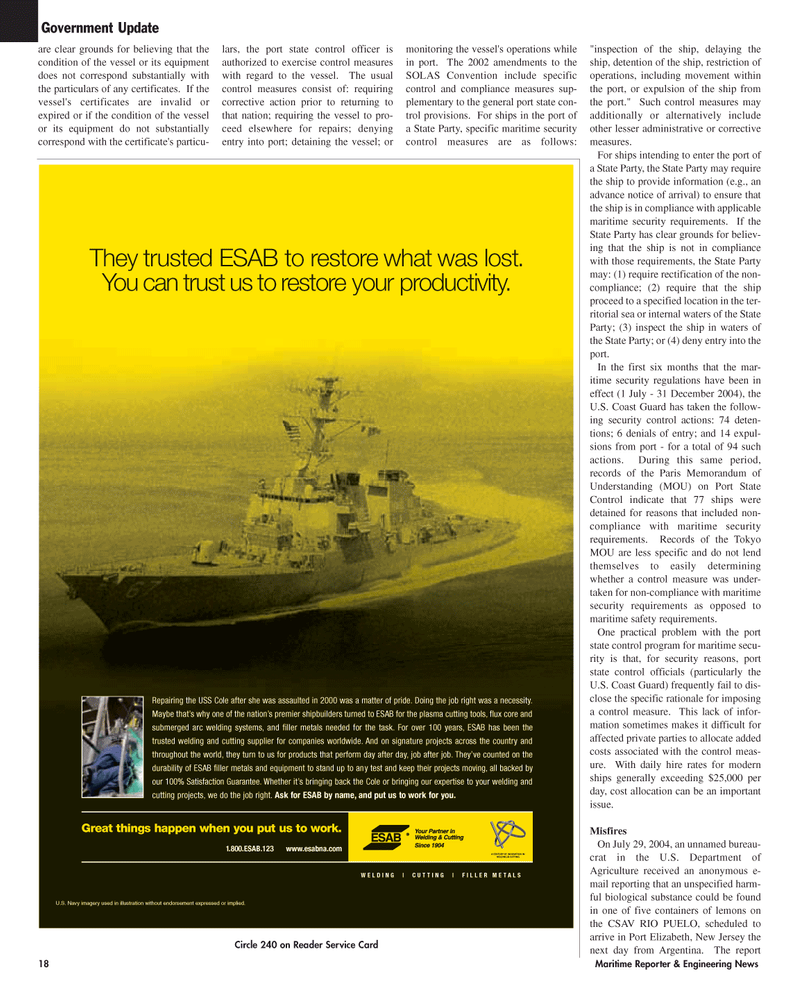
Page 18: of Maritime Reporter Magazine (April 2005)
The Offshore Industry Anual
Read this page in Pdf, Flash or Html5 edition of April 2005 Maritime Reporter Magazine
are clear grounds for believing that the condition of the vessel or its equipment does not correspond substantially with the particulars of any certificates. If the vessel's certificates are invalid or expired or if the condition of the vessel or its equipment do not substantially correspond with the certificate's particu- lars, the port state control officer is authorized to exercise control measures with regard to the vessel. The usual control measures consist of: requiring corrective action prior to returning to that nation; requiring the vessel to pro- ceed elsewhere for repairs; denying entry into port; detaining the vessel; or monitoring the vessel's operations while in port. The 2002 amendments to the
SOLAS Convention include specific control and compliance measures sup- plementary to the general port state con- trol provisions. For ships in the port of a State Party, specific maritime security control measures are as follows: "inspection of the ship, delaying the ship, detention of the ship, restriction of operations, including movement within the port, or expulsion of the ship from the port." Such control measures may additionally or alternatively include other lesser administrative or corrective measures.
For ships intending to enter the port of a State Party, the State Party may require the ship to provide information (e.g., an advance notice of arrival) to ensure that the ship is in compliance with applicable maritime security requirements. If the
State Party has clear grounds for believ- ing that the ship is not in compliance with those requirements, the State Party may: (1) require rectification of the non- compliance; (2) require that the ship proceed to a specified location in the ter- ritorial sea or internal waters of the State
Party; (3) inspect the ship in waters of the State Party; or (4) deny entry into the port.
In the first six months that the mar- itime security regulations have been in effect (1 July - 31 December 2004), the
U.S. Coast Guard has taken the follow- ing security control actions: 74 deten- tions; 6 denials of entry; and 14 expul- sions from port - for a total of 94 such actions. During this same period, records of the Paris Memorandum of
Understanding (MOU) on Port State
Control indicate that 77 ships were detained for reasons that included non- compliance with maritime security requirements. Records of the Tokyo
MOU are less specific and do not lend themselves to easily determining whether a control measure was under- taken for non-compliance with maritime security requirements as opposed to maritime safety requirements.
One practical problem with the port state control program for maritime secu- rity is that, for security reasons, port state control officials (particularly the
U.S. Coast Guard) frequently fail to dis- close the specific rationale for imposing a control measure. This lack of infor- mation sometimes makes it difficult for affected private parties to allocate added costs associated with the control meas- ure. With daily hire rates for modern ships generally exceeding $25,000 per day, cost allocation can be an important issue.
Misfires
On July 29, 2004, an unnamed bureau- crat in the U.S. Department of
Agriculture received an anonymous e- mail reporting that an unspecified harm- ful biological substance could be found in one of five containers of lemons on the CSAV RIO PUELO, scheduled to arrive in Port Elizabeth, New Jersey the next day from Argentina. The report 18 Maritime Reporter & Engineering News
Government Update
Repairing the USS Cole after she was assaulted in 2000 was a matter of pride. Doing the job right was a necessity.
Maybe that’s why one of the nation’s premier shipbuilders turned to ESAB for the plasma cutting tools, flux core and submerged arc welding systems, and filler metals needed for the task. For over 100 years, ESAB has been the trusted welding and cutting supplier for companies worldwide. And on signature projects across the country and throughout the world, they turn to us for products that perform day after day, job after job. They’ve counted on the durability of ESAB filler metals and equipment to stand up to any test and keep their projects moving, all backed by our 100% Satisfaction Guarantee. Whether it’s bringing back the Cole or bringing our expertise to your welding and cutting projects, we do the job right. Ask for ESAB by name, and put us to work for you.
Great things happen when you put us to work. 1.800.ESAB.123 www.esabna.com
They trusted ESAB to restore what was lost.
You can trust us to restore your productivity.
WELDING | CUTTING | FILLER METALS
U.S. Navy imagery used in illustration without endorsement expressed or implied.
Circle 240 on Reader Service Card
MR APRIL 2005 #3 (17-24).qxd 4/1/2005 2:53 PM Page 2

 17
17

 19
19
